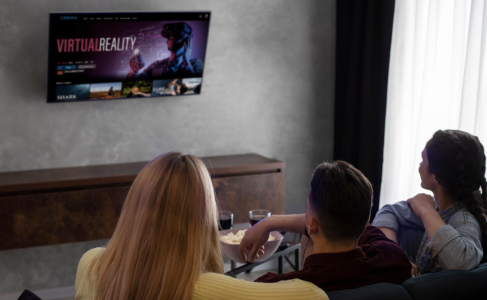Shocking TV Update: The 'C-word' is no longer taboo – Find out why it's airing uncensored!
By
Seia Ibanez
- Replies 79
In a turn of events that has left many Australians reeling, the once unspeakable 'C-word' has made its way into mainstream television, uncensored and unapologetic. This seismic shift in broadcasting standards has sparked a fiery debate among viewers, parents, and linguists alike, as society grapples with the implications of this linguistic liberation.
The 'C-word', historically regarded as one of the most offensive terms in the English language, has been creeping into the living rooms of families across the nation, thanks to scenes like those in the New Zealand series 'After the Party.' In a particularly bold moment, the character Penny, played by Robyn Malcolm, uses the term to describe a student, without the expected censorship. This scene, among others, has become a talking point for its raw portrayal of frustration, resonating with many, including perhaps some tight-lipped educators.
The shock doesn't end there. Charlotte Crosby, of the UK's 'Geordie Shore' fame, expressed her astonishment at the frequency with which the term is used in the Australian adaptation, Aussie Shore.'While the British version limited the use of the word, the Australian iteration lets it fly freely, though it's bleeped out for UK audiences.
This newfound prevalence on TV has led to a cultural examination of the word's power and place in society. Streaming services, with their global reach and lack of traditional broadcasting constraints, have played a significant role in normalizing the term. Linguists suggest that this increased usage could dilute its shock value and offensive nature, a phenomenon known as 'verbicide.'
Australia's unique relationship with the 'C-word' is complex. The country is known for its more relaxed attitude towards the term, often using it in a paradoxically affectionate manner. However, the transition from street slang to broadcasted dialogue has been significant. Shows from the US, UK, and beyond are now presenting the word unfiltered to Australian audiences, regardless of age.
The conversation around the 'C-word' isn't new. Feminist icon Germaine Greer has long advocated for its normalisation, while comedian Rodney Rude faced legal consequences for its use in his stand-up routines. The word's journey from taboo to television has been gradual but persistent, with shows like 'Sex and the City' and 'RuPaul's Drag Race' incorporating it into their narratives, often with a twist of empowerment or humour.
Yet, not everyone is on board with this linguistic evolution. Many parents and grandparents are concerned about the potential impact on children and the perpetuation of misogyny. Parenting experts emphasise the importance of parental controls and boundaries in media consumption to protect young minds from harmful language.
On the flip side, some individuals, like edgy wedding celebrant Ashley Bunney, welcome the unfiltered use of the word on TV, seeing it as a reflection of reality and a break from sanitised programming.
As the 'C-word' continues to spark controversy and conversation, it's clear that its place in Australian media is evolving. Whether this trend will lead to a broader acceptance or a backlash remains to be seen. What is certain is that the dialogue around language, censorship, and cultural norms is far from over.

So, dear members of the Seniors Discount Club, we turn to you for your thoughts. How do you feel about the increasing presence of the 'C-word' on television? Is it a sign of progress and free speech, or a step too far in the erosion of decency? Share your opinions with us, as we navigate this uncharted territory in the landscape of modern broadcasting.
The 'C-word', historically regarded as one of the most offensive terms in the English language, has been creeping into the living rooms of families across the nation, thanks to scenes like those in the New Zealand series 'After the Party.' In a particularly bold moment, the character Penny, played by Robyn Malcolm, uses the term to describe a student, without the expected censorship. This scene, among others, has become a talking point for its raw portrayal of frustration, resonating with many, including perhaps some tight-lipped educators.
The shock doesn't end there. Charlotte Crosby, of the UK's 'Geordie Shore' fame, expressed her astonishment at the frequency with which the term is used in the Australian adaptation, Aussie Shore.'While the British version limited the use of the word, the Australian iteration lets it fly freely, though it's bleeped out for UK audiences.
This newfound prevalence on TV has led to a cultural examination of the word's power and place in society. Streaming services, with their global reach and lack of traditional broadcasting constraints, have played a significant role in normalizing the term. Linguists suggest that this increased usage could dilute its shock value and offensive nature, a phenomenon known as 'verbicide.'
Australia's unique relationship with the 'C-word' is complex. The country is known for its more relaxed attitude towards the term, often using it in a paradoxically affectionate manner. However, the transition from street slang to broadcasted dialogue has been significant. Shows from the US, UK, and beyond are now presenting the word unfiltered to Australian audiences, regardless of age.
The conversation around the 'C-word' isn't new. Feminist icon Germaine Greer has long advocated for its normalisation, while comedian Rodney Rude faced legal consequences for its use in his stand-up routines. The word's journey from taboo to television has been gradual but persistent, with shows like 'Sex and the City' and 'RuPaul's Drag Race' incorporating it into their narratives, often with a twist of empowerment or humour.
Yet, not everyone is on board with this linguistic evolution. Many parents and grandparents are concerned about the potential impact on children and the perpetuation of misogyny. Parenting experts emphasise the importance of parental controls and boundaries in media consumption to protect young minds from harmful language.
On the flip side, some individuals, like edgy wedding celebrant Ashley Bunney, welcome the unfiltered use of the word on TV, seeing it as a reflection of reality and a break from sanitised programming.
As the 'C-word' continues to spark controversy and conversation, it's clear that its place in Australian media is evolving. Whether this trend will lead to a broader acceptance or a backlash remains to be seen. What is certain is that the dialogue around language, censorship, and cultural norms is far from over.
Key Takeaways
- The use of the word historically considered the most offensive in the English language is on the rise on television, with Australians becoming more desensitised to it.
- Streaming services and an increase in its usage on TV scripts have contributed to its broader acceptance and potential decrease in its perceived profanity.
- Linguists and scholars offer mixed views on the word's reclamation and its redirection from a term of offense to one of power or endearment within certain communities.
- While some welcome the change, seeing it as an evolution of language, many parents and grandparents express concern over the potential impact on children and the importance of maintaining decency and respect in public broadcasting.
So, dear members of the Seniors Discount Club, we turn to you for your thoughts. How do you feel about the increasing presence of the 'C-word' on television? Is it a sign of progress and free speech, or a step too far in the erosion of decency? Share your opinions with us, as we navigate this uncharted territory in the landscape of modern broadcasting.








